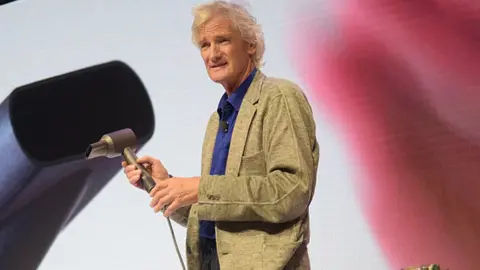Dyson calls UK approach to economy 'stupid'
 Getty Images
Getty ImagesSir James Dyson has accused the government of having a "stupid" and "short-sighted" approach to the economy and business in the UK.
He said growth had "become a dirty word" during Rishi Sunak's premiership.
Writing in the Daily Telegraph, the Dyson founder urged the government to "incentivise private innovation and demonstrate its ambition for growth".
Michael Gove, levelling-up secretary, said the government was "firing on all cylinders" to help business.
A prominent supporter of Brexit with a fortune worth £23bn according to the Sunday Times Rich List, Sir James said the government believed it could "impose tax upon tax on companies in the belief that penalising the private sector is a free win at the ballot box".
"This is as short-sighted as it is stupid. In the global economy, companies will simply choose to transfer jobs and invest elsewhere," he warned.
The high-profile businessman's comments come after the government announced in the autumn £25bn worth of tax rises in an attempt to balance the books and restore credibility to the UK's finances after the economic fallout of the Liz Truss and Kwasi Kwarteng mini-budget.
One of the mini-budget polices reversed was a change to corporation tax, which is paid to the government by UK companies and foreign companies with UK offices. It is set to rise from 19% to 25% in April.
UK businesses, as well as households, are also dealing with the highest rate of inflation for four decades, with energy bills driving price rises through supply chains.
Chaz Curry is one of thousands of business owners to close their doors in 2022.
He told the BBC he decided to shut Roots Cycleworks, a bicycle repair and hire and repair shop based in Exmouth, because of several factors including inflation, import issues, supplies of parts and customers' disposable income decreasing. He is set to start a new job next month.
 ChazCurry
ChazCurry"All of those pressures, it's kind of death by a thousand cuts," he told the BBC's Today programme. "The business this time last year was in a very good state and we have literally watched it over the course of months sort of go down the plug hole."
Mr Curry said he was not looking for government handouts, but added he did believe some business policies had been "a bit route one" and that ministers had been distracted by the end of Boris Johnson's premiership and the following Conservative leadership elections at a time when governments overseas "seemed to be acting to put money back into the general public's pocket".
"Do I feel like there could have been a little bit more creative thinking? Yeah, maybe I do," he said.
'Covid inertia'
In his comment piece, Sir James repeated his concern over working-from-home policies following the height of the Covid pandemic.
He said the government had "yet to direct" workers to return to workplaces after "ordering them to stay at home".
"This has badly damaged the country's work ethic," he said.
He argued "no weight" had been afforded to the "importance of face-to-face collaboration, shared culture, mental health, productivity and output, or the training of new and young employees", which he said was "fundamental to the success of businesses and employees alike".
But the entrepreneur wrote that the UK could "shake off its Covid inertia" and "turn things around, but only if fast-growing companies are allowed to thrive here".
He said the government had a "role to play", starting with the spring Budget in March.
"It must incentivise private innovation and demonstrate its ambition for growth," he said.
However, Mr Gove rejected Sir James' view that the country needed to "shake off its Covid inertia", saying the government was committed to reducing inflation and growing the economy.
"If we are being accused of inertia I think it's important that we stress the energy at which we are pursing smarter regulation in a variety different ways that will help enterprise," he told the BBC.
Britishvolt collapse 'disappointing'
The UK electric vehicle industry was dealt a blow earlier this week when battery start-up Britishvolt collapsed into administration, with the majority of its 232 staff made redundant.
The firm had planned to build a giant factory to make electric car batteries in Blyth, Northumberland, and ministers had hailed it as a "levelling up" opportunity that would boost the region's economy and support the future of UK car making.
Sir John Armitt, chair of the National Infrastructure Commission, which advises the government, told the BBC it the Britishvolt failure was "very disappointing", but said he was hopeful the plant could be "resurrected".
Mr Gove said the government knew the site where Britishvolt had planned its factory was "hugely valuable, hugely attractive".
"We do know the approach we are taking towards electric vehicles will mean there will be more investment of this kind in the future," he added.
Asked about Sir James' comments, Sir John said investment in the UK was "probably declining" in part because of the concern over regulatory changes with the EU following Brexit.
"I think we should as far as possible continue to comply with EU regs because that makes it easier for companies to compete in Europe," he added.
Sir James had faced criticism previously when he announced he would relocate his firm's global head office to Singapore from Malmesbury in Wiltshire in 2019.
In 2021, he moved his residency back to the UK from Singapore.
